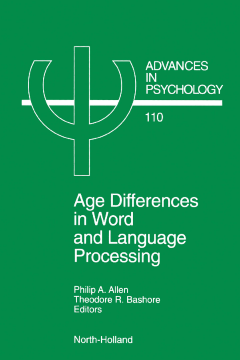
Additional Information
Book Details
Abstract
Component cognitive processes have played a critical role in the development of experimental aging research and theory in psychology as attested by articles published on this theme. However, in the last five to ten years, there has been a substantial increase in the number of articles attempting to isolate a single factor (or small subset of factors) responsible for age differences in information processing. This view of aging is frequently termed the complexity model of the generalized slowing model, the primary assumption being that age differences in cognition are due simply to a relatively larger performance decrement on the part of older adults (compared to younger adults) as task complexity increases. Because generalized complexity theorists have questioned the utility of using component cognitive processes as theoretical constructs, the editors feel it is time to restate why component cognitive processes are critical to any thorough understanding of age differences in cognition. Thus the present edited volume represents an attempt to demonstrate the utility of the process-specific approach to cognitive aging. Central to this effort are illustrations of how regression analyses may provide evidence for general slowing by maximizing explained variance while at the same time obscuring local sources of variance.
The book concentrates on age differences in word and language processing, because these factors relate to reading which is a critical cognitive process used in everyday life. Furthermore, age differences in word and language processing illustrate the importance of taking component cognitive processes into consideration. The breadth of coverage of the book attests to the wide range of cognitive processes involved in word and language processing.
